I just now finished writing an essay about older novels worth a read. Which led me to wonder: what older collections are worth a read? Fortunately my library is capacious, even if my memory sometimes fails. So, here are notes on five older collections that you might enjoy.1
Do I own stock in a used bookstore? No, I have no financial incentive to recommend older works that might be out of print. In fact, I was surprised to discover (on searching) that some of these collections were still in print (if electronic versions can be considered print). The rest are all available through the wonders of online used book stores.
The Diploids and Other Flights of Fancy by Katherine MacLean (1962)
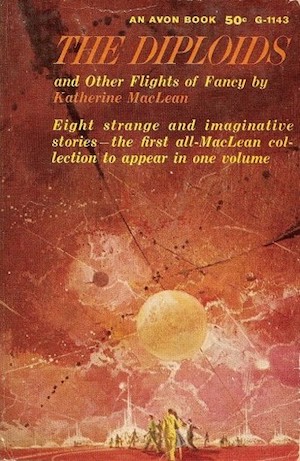
I was introduced to the works of SFWA author emeritus Katherine MacLean through CBC Radio summer rebroadcasts of classic X Minus One episodes. Thanks to the CBC, I knew that I wanted this MacLean collection as soon as I saw it. It was a lucky find, because MacLean’s most productive period largely predated my birth.
Diploids contains eight MacLean stories drawn from the pages of Galaxy and Astounding. Of particular note: “And Be Merry,” which explores some untoward consequences of very long lives. “Pictures Don’t Lie” is a tale of first contact (also complicated by unforeseen factors). “The Snowball Effect” describes a sociological experiment that succeeds beyond researchers’ wildest nightmares. I think you will discern a theme here.…
The collection is a worthy introduction to MacLean’s fiction, and is available as an ebook.
Neutron Star by Larry Niven (1968)
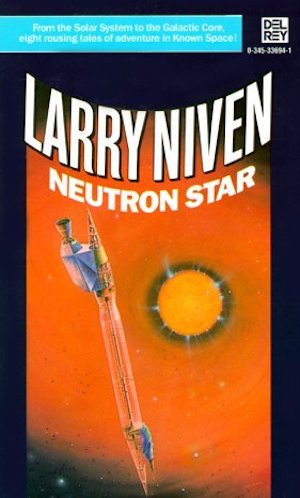
I first encountered Larry Niven when as a nine-year-old I read his story “Leviathan” in the August 1970 issue of Playboy. However, what enticed me to purchase this volume wasn’t my encounter with “Leviathan” (which does not appear in this collection) but rather the eye-catching Rick Sternbach cover.
There is good reason to believe that if one wants to hook readers on Niven’s work, this is the collection with which to do it. The eight stories are all set in Niven’s Known Space setting. Most date from 1966 or 1967 (with one 1968 straggler), the period in which a then-young Niven was doing his worldbuilding. While some of the hard SF puzzle stories don’t hold up to close examination (I am afraid the protagonist of “Neutron Star” absolutely should have died), the stories evince a charming youthful exuberance.
Available as an ebook.
A Pride of Monsters by James H. Schmitz (1970)
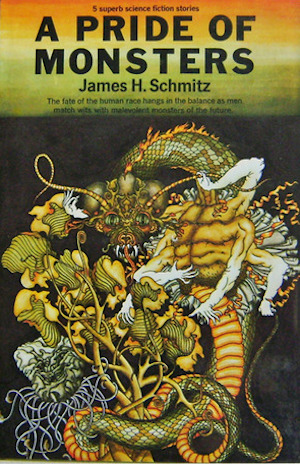
I credit Arthur C. Clarke2 for drawing my attention to Schmitz by including Schmitz’ story “Grandpa” in the Clarke-edited anthology Time Probe. The story’s treatment of ecological themes ensured that I’d pick up any Schmitz books that crossed my path.3
A Pride of Monsters draws exclusively from magazines edited by John W. Campbell, Jr. (Astounding, later renamed Analog, and Unknown Worlds). All of the stories on offer centre on some manner of monster, but they manage to be otherwise quite diverse. Readers unfamiliar with Schmitz should get a decent sense of his range.4
Available as a used paperback.
Eyes of Amber and Other Stories by Joan D. Vinge
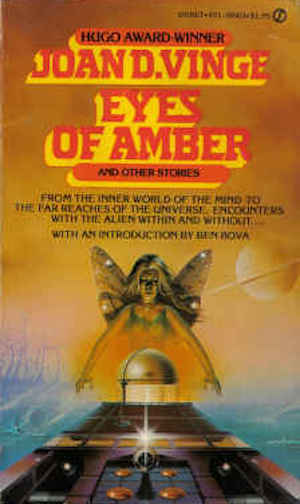
I believe I first encountered Vinge in the Ben Bova-edited June 1977 issue of Analog Science Fiction/Science Fact. The June 1977 issue was a special women’s issue and its exemplary quality ensured I would snap up books by the contributors. Because it was the third issue of Analog I had ever read, the June 1977 issue set lofty expectations I am sad to say later issues failed to meet.
Although modern readers are most likely to have encountered Vinge’s novels5, Vinge began her publishing career with memorable novellas and novelettes. It’s therefore quite frustrating that, to my knowledge, there are only three collections of her work, all out of print. Of the three, Eyes of Amber and Other Stories is by far the best. In addition to the title story, a tale of aristocratic ambition and rock & roll set on Titan, the collection provides tales that range from straight-up adventure to puzzle stories, from classic hard SF to a deep space murder thriller, all skillfully written.
Available as a used paperback.
Forests of the Night by Tanith Lee (1989)
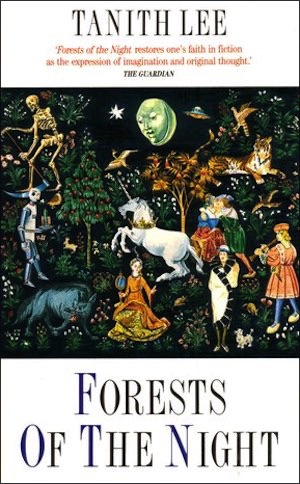
I first encountered Lee with her classic Drinking Sapphire Wine. My taste for her fiction was solidified by her 1983 collection of re-imagined fairy tales, Red as Blood, or Tales from the Sisters Grimmer, which was exactly the right book at the right time, for reasons explained here. Red as Blood remains my favourite Lee collection…but it only narrowly edges out my second favourite Lee collection. This one.
Forests of the Night focuses mainly on Lee’s 1980s output, an indication of how prolific she could be. While is there some overlap with other collections, it is minimal. In addition to the delightful assortment of Lee tales, the collection has something other Lee collections often lacked: introductions by the author. The only grounds upon which I could criticize the collection is no fault of the author’s: North American publishers lost their interest in Lee about 1990 and consequently there has never been a North American edition.
Available in ebook and hardcover… for British readers.
***
Of course, the advent of mass market paperbacks and the fact that many authors began their careers with shorter pieces means there is an abundance of diverting collections I could have mentioned, but did not. Perhaps your favourites were overlooked. Feel free to mention them in the comments, which are, as ever, below.
In the words of fanfiction author Musty181, four-time Hugo finalist, prolific book reviewer, and perennial Darwin Award nominee James Davis Nicoll “looks like a default mii with glasses.” His work has appeared in Interzone, Publishers Weekly and Romantic Times as well as on his own websites, James Nicoll Reviews (where he is assisted by editor Karen Lofstrom and web person Adrienne L. Travis) and the 2021 and 2022 Aurora Award finalist Young People Read Old SFF (where he is assisted by web person Adrienne L. Travis). His Patreon can be found here.
[1]My understanding is that a collection is composed of short works by a single author or set of collaborators, while an anthology is composed of works by a diverse array of authors. You may ask, “Didn’t Gardner Dozois title his best SF of the year anthologies collections?” Yes. Yes, he did. You may also ask “Wouldn’t that annoy you each time you type in the title of successive anthologies in that series?” Yes. Yes, it does.
[2]Some of you may be wondering if the only reason I was aware of Clarke was because of his “A Meeting with Medusa,” published in the December 1971 “Playboy”? No. I was aware of him because my family’s library had a number of non-fiction books on rockets, and Clarke’s “The Exploration of Space” was among them—though I did read that issue of “Playboy.”
[3]My Schmitz purchases included “The Witches of Karres.” It is not a collection, however, just an unevenly structured novel, and so falls outside the theme of this piece.
[4]ISFDB can be your friend in this matter. Tracking down recent versions of old stories can be the bane of a reviewer’s existence.
[5]Although I have to say getting my hands on a new hard copy of her second novel, “The Snow Queen,” has not been anywhere as easy as I expected.











Would it be possible to have the tag for Lee altered from Tannith to Tanith?
@1 – Fixed, thanks!
I bought a used hardcover copy of The Diploids due to some earlier mention by someone on Tor.com, and I’m glad I did.
As a kid int he 70’s, two of the collections that I most remember are
Asimov’s “I Robot” and Heinlein’s “The Past Through Tomorrow”. The Heinlein stories include “Lifeline”, “The man who Sold the Moon”, all leading up to the introduction of Lazarus Long in “Methuselah’s Children”.
It always annoyed me that The Past Through Tomorrow omitted Orphans of the Sky but I suppose ending with that short novel would have been too much of a downer.
@@.-@. Robert – Agree! I remember reading I, Robot very young and having my mind blown.
I remember really enjoying Alan Dean Foster’s collections With Friends Like These and Who Needs Enemies. Also, one of David Brin’s first collections, although I do not remember if it was The River of Time or Otherness.
Does Bradbury’s The Martian Chronicles count as a collection? It was the first book where I remember loving something so ultimately sad. Reminds me I need to move The Illustrated Man up my TBR pile/list.
The Best of Eric Frank Russell is one of my favorites.
It might not be old enough to count as a “classic” under JDN rules (where I see at least thirty years old might be the cutoff), but I really enjoyed Charles Sheffield’s The Complete McAndrew from Baen from around the turn of the century.
It’s a collection of short stories about a physicist who invents a high-speed space craft and each story is a good, old-fashioned physics puzzle based on the characteristics of the craft.
@8 – was that the one with the most appalling pun on Killing vector?
8: I could have fit McAndrew in with the sufficiently vintage The McAndrew Chronicles, (Tor, June 1983) but if I was going to include Sheffield, I’d likely have opted for 1979’s Vectors or possibly 1981’s Hidden Variables.
Aw, the ability to insert links and cover art went away again.
A E van Vogt
Away and Beyond.
Destination Universe.
Still I Persist in Wondering and Good Neighbors and Other Strangers by Edgar Pangborn
The Wind’s Twelve Quarters by Ursula K. Le Guin
Seconding, The Best of Eric Frank Russell
I was just looking at my copy of Good Neighbors. Also, there is a reason why, of all the books in the Ballantine Classics run, I chose the EFR as the first one to review.
@5 James
I’m fine with Orphans of the Sky not included in TPtT because it was so peripheral. It gets name-checked in Time Enough for Love with a mention of having found the descendants of the lifeboat that escaped from the Vanguard. And there’s a mention of Rhysling the poet. But that’s all pretty minor. And from a practical point of view, I suspect adding another novel, even a short one, to TPtT would have turned it into a two-volume collection.
Okay, you’ve done novels and collections. How about anthologies?
I recall two: Buy Jupiter, by Asimov, and Earth is Room Enough, by the same author. Enjoyed both immensely. Also coming to my mind is Arthur C. Clarke’s The Wind from the Sun, with its very memorable “The Food of the Gods”…
16: Laughs maniacally in foreshadowing.
My personal favorite collection is incredibly hard to find (and be affordable,) so it mostly exists in my memory: Tomorrow’s Children edited by Isaac Asimov. It held “Gilead” by Zenna Henderson, “It’s a Good Life” by Jerome Bixby, “A Pail of Air” by Fritz Leiber, and fifteen other stories.
Well, per the footnote, I suppose the following recommendation is technically an anthology, not a collection, but I’ve never seen anyone mention it ever. One of my favorites is Laughing Space, edited and collated by Isaac Asimov and Janet Jeppeson. Essentially a host of short stories and poems and comic panels relating science fiction and humor, including cures for the cold, the quest for silence, and one of the best shaggy dog short stories I’ve ever read.
But not really a collection.
Lloyd Biggle Jr, Keith Laumer ad Robert Sheckley, three more authors from the 60s who deserve to be remembered for their great stories.
I thought “The Food of the Gods” was a novel by H.G.Wells.
Alice “James Tiptree, Jr.”‘s three collections for Del Rey: Out of the Everywhere, Star Songs of an Old Primate, and Warm Worlds and Otherwise. With introductions in which Robert Silverberg puts egg on his own face and Ursula K. Le Guin calls him to task him for it.
@22 — and here I thought the food of the Gods was pineapple-and-pepperoni pizza…
@13: Kudos for the Pangborn and LeGuin collections, all favorites of mine! Pangborn deserves more love.
Along those lines, I am driven to nominate Roger Zelazny’s The Last Defender of Camelot and an oft-forgotten package of genius, Over the River and Through the Woods by Clifford Simak.
@23 – For me it would the one before those three, the 1973 Ace collection Ten Thousand Light-Years from Home
Roger Zelazny blazed through the SF firmament in the 1960s. His collection “The Doors of His Face, the Lamps of His Mouth” will tell you why. (Well, besides the Amber novels and the Hugo-winning novel “Lord of Light”).
I have two from Arthur C. Clarke The Nine Billion Names of God which has the title story as well as “The Sentinel” the inspiration for 2001 and “The Star.” Also I love Tales from the White Hart which has some great sci-fi humor.
@6 The Martian Chronicles is a fix-up novel. Much of the material had already appeared as short fiction in magazines when a publisher’s editor suggested that Bradbury turn that material into a novel. The last lines of “The Million Year Picnic” always get me every time I reread it.
@21 I agree on Biggle, Sheckley, and Laumer. Biggle’s The Metallic Muse is a favorite.
Does “The Best of Cyril M. Kornbluth” qualify?
I vaguely remember reading a Review of this in a SF magazine (Analog?), where the reviewer made the point that several of the stories has truly memorable CLOSING sentences. E.g. “The last thing he learned was that death is the end of pain.”
I’ve long thought that the best way to be introduced to a new writer is their first collection. The majority of science fiction writers learn their craft through short stories, and during that time they’ll often be at their most creative, exploring ideas that may last through their career. R.A. Lafferty, William Gibson, Pat Cadigan and Kelly Link spring immediately to mind, and there are many others, some already referenced in earlier comments.
Tabitha Lee is one of my favorite authors, I collected everything I could find by her in the 80s. Sabella and the silver metal lover would both be wonderful movies or series!
Was the Vinge story A View From a Height? I read the same story in an Analog my Dad picked up at a used bookstore, sometime in 77. Fifty years later I still remember the name of the story, and what it was about. Sadly I never became a Vinge fan.
The Deathbird and Other Stories, by Harlan Ellison. A life-changing book for me, and one I’ve recommended to many people. For as famous and popular as he was, it’s strange how quickly his work has fallen off people’s lists.
I offer no dispute on the literary quality of the contents, but the James H. Schmitz collection that always pops up in my mind is the unbeatably titled A Nice Day for Screaming and Other Tales of the Hub.
“The Jack Vance Treasury,” 2007.
I still have and enjoy The Best of Stanley G. Weinbaum and A Song for Lya and Other Stories by George R. R. Martin.
Bayushi @19 I remember that collection (and many of those stories) fondly.
Josephine Saxton, The Power of Time
R,A, Lafferty, Nine Hundred Grandmothers
I fear my dream of being a Tanith Lee completist is doomed never to happen.
How about the Worlds of H. Beam Piper? Piper wrote some fun and interesting sci-fi.
@19 Bayushi and @37 OtterB Tomorrow’s Children edited by Asimov is an anthology not a collection. JND clearly stated the difference between the two in his footnotes.
Two old collections I like are Ray Bradbury’s The Illustrated Man and Theodore Sturgeon’s E Pluribus Unicorn with stories like “Cellmate” and “The Professor’s Teddy Bear”. I’ll also add Sturgeon’s Not Without Sorcery with “It”.
I had a bit of a mental stop when I read “as a nine-year-old’ and “in Playboy.” I know Playboy published a lot of legitimate fiction, but that does seem odd for a nine-year-old to have access to.
If the reading material was in the house, I was allowed to read it, same as how I was also allowed to play with any firearms, explosives, and accelerants that happened to around. The latter left me with permanent hearing loss, a bit of nerve damage in my left hand [1] and scars [2] but I’m sure there were no ill effects from letting me flip through e.g. reports on the effects of nuclear weapons as a kid.
1: Once the fuse is lit, Mr Homemade Grenade is no longer your friend.
2: Under no circumstances attempt to hastily stamp out a thermite fire.
@41 second the motion for E Pluribus Unicorn. I find some of Sturgeon’s later work disappointing, but this is the real stuff.
Neutron Star was the first adult sf I read at age 8 or 9. My dad got a bunch of books from a guy at work who decided he didn’t like science fiction, (horrible thought). I was already an compulsive reader and had demolished most of the books in the kids section of our local library.
I had the book in my school bag to read at lunch time as it was a rainy day. I showed it to the teacher and he borrowed it the next day, (with parental consent , it was my dad’s book). Later that week we had a lesson about how (earthly) tides worked.
Re: Tanith Lee Completism, a few new-to-me Tanith Lee e-books have popped up on Amazon since last I looked. A couple are collections of her work edited by other people, but there’s also a duology, The Blood of Roses, that apparently was previously released in 1990 and only available in hardcover in the UK.
(Tanith Lee completism being one of those goals which it seems one may approach asymptotically but never achieve…)
@43 I suppose you’re lucky (and I suppose the rest of us, or at least those within some distance of your childhood home) that fissile material was not then available by mail order.
Like you, I was able to read anything within reach, which is how I was exposed to a fair measure of new age SF at a tender age. Living in an apartment, the same understandably did not apply to the other hazardous materials you mention.
47: I think in olden days chemistry sets came with at least little uranium but U238, not U235.
A surprising number of nuclear reactors use my father’s heat transfer work, not bad for a guy who has been dead since 1978.
John Varley : The Persistence of Vision (1978) (UK: In the Hall of the Martian Kings)
@34 Serai: I want to second the recommendation for _The Deathbird and Other Stories_ by Harlan Ellison. All were amazing, but one particular short story therein freaked me out so much that I clearly remember it 40 years later, “I Have No Mouth, and I Must Scream.”
Zenna Henderson’s collections- love them all!
THE COMPLEAT WEREWOLF, a collection of short stories by Anthony Boucher. Everyone remembers him for his stellar editing at F&SF (and there’s that Bouchercon thing), but he was also an entertaining writer with a clever imagination.
The Best of C.L. Moore is still my favorite collection of sci-fi. In London there’s a great open-air used book market under the bridge on the South Bank of the Thames. I have found some great Scifi/fantasy novels, collections and anthologies there.
I greatly enjoyed all of Spider Robonsons writing. Growing up reading Sci-fi,in my opinion makes us better people. “Shared pain is lessened, shared joy is amplified” I’m sure I misquoted it but the books were great.
@52 I enjoyed Professor “Woof-woof” (and he’s a great precursor to Werewolf by Night and, more recently, Robert Kirkman’s Astounding Wolf-man) but give me Poul Anderson’s Operation Chaos any day even though it’s a fix-up novel rather than a collection.
I found it more SFnal and less pulp action-y by far.
The Wind’s Twelve Quarters
The Early Asimov
The Past Through Tomorrow
The Nine Billion Names of God
Dilvish, the Damned
The Enchanter Compleated
Maps in a Mirror
And many more..
Illustrated Man by Ray Bradbury is a nice collection too.
Lord Darcy, by Randall Garrett (2002 edition):
All ten short stories, and Too Many Magicians.
@PamAnderon (51)
Yes!
Zelazny’s Home Is the Hangman (to which I return frequently as some of its ideas turn into reality). Or basically any Zelazny collection. Heinlein, Revolt in 2100, also prescient – if that really counts as a collection (it’s mainly his blockbuster novella “If This Goes On…” plus a couple of short stories for filler). Anne McCaffrey’s To Ride Pegasus.
#37: Do you, like I, sometimes consider how nutty it is that George R.R. Martin is now known for enormous tomes, when he first became known and won awards for short stories and novellas? Of course, his tomes are pretty episodic.
I also read Neutron Star as my first real attempt at SF at the age of 9, during an lengthy airport wait, after I picked up my father’s copy of World of Ptavvs – containing Niven’s most confusing opening scene ever – leading my father to hand me Neutron Star with “Here, you’ll probably like this better.”
Neutron Star was absolutely my gateway to Niven.
My first introduction to Anne McCaffrey was the collection Get Off the Unicorn, released in 1977.
I also loved Spider Robinson and H. Beam Piper.
My other favorites are too new for this. (Zenna Henderson’s Ingathering and Niven’s Flat landed were both released in 1995)
I regret I did a ‘cleanup’ of my library some years back – so many of the collections mentioned I had and are now are drifting to others via the charity shops. I hope others are enjoying them.
I would recommend “The Golden Man” by Phillip K Dick – so much of his work lives on.
I recently discovered the following on the web:
https://archive.org
via this, with a little research, most of the early short stories of the more senior SF authors can be rediscovered via their first appearance in the pulp magazines.
Persistence of Vision is a great call. Wind’s Twelve Quarters too, obvs, but that one seems so iconic that I naively feel it’s in little danger of being forgotten.
George RR Martin’s Songs the Dead Men Sing. I don’t own a copy – had it from the library 40 years ago – but I remember there being some great stories in there. The Needle Men sticks in my mind, for some reason, alongside Sandkings and Nightflyers.
Anyone who has not yet found The John Farley Reader, a retrospective of 30 years of excellent stories, has something special to anticipate!
The Diploids available as ebook? Where? Certainly none of the links the Goodreads link leads to qualify (ok, I didn’t check Audible, but with my hearing audiobooks are out). Note, as for paperbacks, Abe books has a couple at decent prices and Amazon figures it’s a Collector’s Item with prices to match…
So many good choices that I remember so fondly; Lord Darcy in particular. But one of, if not the first, book I read from the adult side of the library was The Worlds of Robert F. Young and I would read it again tomorrow if I had a copy.
Sorry to pick nits, @50. Lewis, but “I Have No Mouth, and I Must Scream” doesn’t appear in Deathbird Stories. He included it in an eponymous collection and again later in Alone Against Tomorrow (another great Ellison collection). Great story, though. I memorized it in high school and used to tell it on camping trips by the fire.
As for the Heinlein fans raving about The Past through Tomorrow—eh, it’s okay. For real creativity, though, I don’t think you can beat Heinlein’s “The Unpleasant Profession of Jonathan Hoag” and Other Stories. It was later reprinted under a shorter dorky title that had an X in it.
No Alfred Bester fans out there? The Vintage 1997 collection “Virtual Unrealities” is fantastic, especially if you liked The Stars My Destination. Trending even slightly older than those stories would be the “Nightmares and Geezenstacks” collection from Frederic Brown. “Entity Trap” in that collection blew me away for the parallels to the then-current situation when I read it a few years back. Highly recommended just for that one story–you’ll see what I mean immediately.
Avram Davidson was one of the premier writers of short fiction in the 20th century. Wonderful as his first collection, Under Strange Stars And Skies is, a distillation of his best can be found in The Avram Davidson Treasury.
For sheer fun, my favorite collection is George Alec Effinger’s 1993 “Maureen Birnbaum, Barbarian Swordsperson,” which provides nosebleed seats to half a dozen classic SF venues in a single compact volume. Good luck finding this one, and don’t lend it out!
6XHeinlein simply because it contains the too-often forgotten, wonderfully whimsical “The Man Who Traveled in Elephants”. I was thrilled to read an interview with him where he mentioned in passing this was his favorite of all the things he had written.
At the risk of altering the script, I would feel remiss if I didn’t include in the list, Eric Frank Russell’s “Men, Martian’s, and Machines”. Also, since George (railroad) Martin’s been previously mentioned, his “Tuf Voyaging” mash-up of stories might could be shoe-horned in here. As an aside, I must express my joy and relief that the author felt comfortable enough to mention so many recently maligned author’s from decades passed that were savaged by certain individual’s that, somehow and for some reason, require those worthy’s to do penance for attitudes that were part and parcel of the zeitgeist of their times. For fans of the work who can avoid the worship of their creator’s outside of the personality cult’s that seem such a part of human nature, I feel no shame or guilt. After all, just because I read and enjoyed Burrough’s, that doesn’t make me want to take heroin or hang out with junkies. Although I’m told that many of them are quite erudite and witty, at least while they are conscious.
43: “2: Under no circumstances attempt to hastily stamp out a thermite fire.”
Thanksgiving is approaching in the US, so this seems an appropriate prompt to post a link to one of my favorite videos, wherein a whole turkey, with the aid of ten pounds of thermite, is cooked in less than 30 seconds: “Thermite Thanksgiving” (Don’t try this at home.)
I recommend The Caltraps of Time, by David I Masson, featuring the celebrated Traveller’s Rest and an excellent time travel yarn, alongside other strongly realised and deeply strange tales.
Brian Aldiss
Galaxies like grains of sand.
66: Wildside has Diploids for sale:
https://wildsidepress.com/the-diploids-by-katherine-maclean/
73: With all due respect, not every S has to be preceded by an apostrophe.
Wow, I can’t believe Harlan Ellison’s “The Deathbird and Other Stories” is the only one of his collections to have been mentioned so far. “I Have No Mouth and I Must Scream,” “The Beast That Shouted Love at the Heart of the World,” and “Approaching Oblivion.” Plus “Partners in Wonder,” a collection of collaborations. Crucial, crucial stuff.
Also, Cordwainer Smith, “The Instrumentality of Mankind.”
I’d pick the Best of Cordwainer Smith over the Instrumentality collection.
Casey Agonistes & Other Science Fiction & Fantasy Stories Richard McKenna
A Touch of Infinity Howard Fast
“Angels and Spaceships” is a great collection by Fredric Brown.
Walter M. Miller Jr. wrote some wonderful short stories. “The Best of Walter M. Miller Jr.” from 1980 includes most of them.
I have nothing interesting or insightful to add, which is usually the case and why I rarely comment. But I do wish to express gratitude for the James Davis Nicholl columns hosted on Tor. Their articles, and the resulting comment sections, are always top on my list to read when I finally get through all the reading material I let build up in my inbox.
Poul Anderson’s The Trouble Twisters.
83: Thank you!